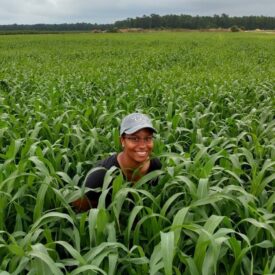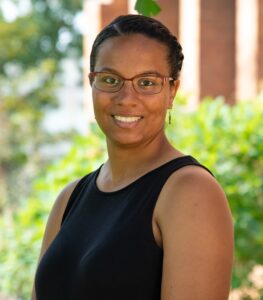Editors Note: We sincerely apologize for the recent Instagram post of an image from this article that had no context and referenced Black History Month. Black History Month is an opportunity to acknowledge the many contributions of African Americans in our development as a nation and society and an opportunity to address ongoing racial injustice. Our School realizes that it is much more than an image and we are committed to making our communications more inclusive.
The following article is part of a series of profiles that feature SEBS-NJAES alumni and staff. We spoke with Kate Brown (SEBS’18) program associate with RCE of Burlington County.
February marks the start of Black History Month, among the most widely recognized heritage months in the cultural calendar of the U.S. It serves as a time in which the contributions of African Americans are celebrated and in recent times, the continued struggle for racial justice in America is highlighted.
To celebrate Black History Month in 2021, Newsroom is featuring members of its SEBS-NJAES community. We spoke with Kate Brown (SEBS’18) program associate with RCE of Burlington County.
What made you choose Rutgers and particularly SEBS?
I originally decided to come to SEBS because I wanted to be a vet for large animals. My high school had an agricultural education program. I looked at 6 colleges in region, but fell in love with Cook campus and SEBS offered a great variety of course options.
I started as an Agriculture and Food Systems major, so I could teach agriculture. In my freshman year I took a Byrne Seminar—a small, one-credit course that matches first-year students with world-renowned faculty from departments and professional schools across the university. They talked about an internship at Snyder Farm, which I pursued and ended up interning there. The people I worked with there and my advisors encouraged me to do research and take plant science. I ended up switching my major to plant science and biotechnology, and later dropped biotech.

Kate Brown sitting in a field of sorghum-sudangrass grown as a cover crop at a commercial blueberry farm in Atlantic County where she was part of a study she was conducting on fescues for blueberry row middles during her undergraduate career. Photo Courtesy of Kate Brown.
What is your favorite Place at Rutgers?
Snyder Farm is my favorite Rutgers place. I’ve had great off-campus experiences interning at Snyder and later working at the Philip Marucci Blueberry and Cranberry Research and Extension Center for three years; I loved it there. But I also loved Cook campus, living on Douglass my first year, and then in the Newell apartments in my second year. The free classes at the gym were great and I discovered the beautiful Rutgers Gardens later.
Are there professors that influenced you?
My favorite professors include: Don Kobayashi (my advisor) who was very helpful and taught plant molecular biology, a foundational course; Ann Brooks Gould, who confirmed my interest in plant pathology; and Ed Lipman, who taught a great agriculture business class. Rong Di and Tiemi Curry taught a Plant Tissue Culture class, which was also excellent.
You are an alumna but also now a program associate with Rutgers Cooperative Extension. Tell us more about that.
I work as a program associate with RCE of Burlington County. It was strange to start my job during the pandemic. I launched the Burlington County Facebook page when I started in order to be able to communicate with my stakeholders. But I really do not have a typical day at work.
I respond to soil test results, provide nutrient recommendations and am the chair for the Farm, Health & Safety Group, which includes attending the Northeast Agricultural Safety and Health Coalition meetings monthly.
I am a rep for the Northeast Cover Crop Council, attend a monthly Board of Agriculture meeting to connect with growers and I spend a lot of time getting acquainted with my farmer clients. I have recently been planning education sessions for the upcoming New Jersey Ag Convention.
Right now, there is a lot of Spotted Lantern Fly and Asian Giant Hornet interest and I’ve been helping with the hemp production guide.
My goal is to be a county agent and I am currently writing my thesis for my Masters in Horticulture, which I will receive from Cornell this year.
Is there anything else you would like to tell us?
Initially SEBS was stressful because of the issues I was having with my Ag and Food Systems major. But the hands-on experiences through my internships were very important and made a big difference. I’m grateful for those opportunities.
In terms of my future involvement with involved with SEBS, I am open to talking to students and in the would eventually like to offer internships to SEBS students through cooperative extension to engage them and provide them with the kinds of hands-on opportunities I had.


